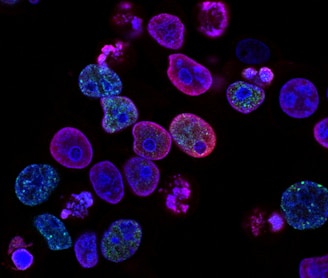Colon Cancer Screening
Information about cancer of the colon


Introduction
Colorectal cancer is the second leading cause of cancer deaths in the U.S., but it is highly treatable when diagnosed early. To help detect colorectal cancer, you can have a screening test for colorectal cancer (also called CRC) at any age. The American Cancer Society recommends that healthy adults over 50 years old get screened for colon and rectal cancers if they are at average risk or higher risk based on family history or other factors.
What is colorectal cancer?
Colorectal cancer is a type of cancer that affects the colon or rectum. It's the third most common type of cancer in men and women in the United States, according to the Centers for Disease Control and Prevention (CDC).
Colon cancer is more likely to develop in older adults, but it can also affect younger people. The average age at diagnosis is 69 years old, but it can occur at any age after 40. Men tend to be diagnosed at an earlier age than women do--about 65 versus 72 years old--but survival rates are about equal between genders after five years from diagnosis with stage 1 tumors (whereas survival drops off dramatically for later stages).
How common is colorectal cancer?
Colorectal cancer is one of the most common cancers in both men and women. It occurs more often in older adults, with an average age at diagnosis ranging from 60-65 years old.
Cancer screening tests for colorectal cancer include colonoscopy and fecal occult blood tests (FOBT). Colonoscopy uses a long, flexible tube with a lighted end to look inside the lower part of your large intestine (colon) for abnormal growths or polyps that could become cancerous over time if left untreated. FOBT screens for hidden blood in stool samples by checking them under a microscope at home; this test can detect bleeding from polyps or early cancer before symptoms appear
What are the symptoms of colorectal cancer?
Colorectal cancer is a condition in which malignant (cancerous) tumors develop in the colon or rectum. Colorectal cancer is also known as colon cancer and bowel cancer.
The symptoms of colorectal cancer vary depending on where the tumor begins and whether it has spread to other parts of your body. The most common symptom of colorectal cancer is blood in your stool (bowel movement). Other symptoms include:
Abdominal pain or discomfort that doesn't go away after several days
Diarrhea that lasts longer than usual or comes with fever and/or chills
Nausea
If you experience any of these symptoms, see a doctor right away.
What are the risk factors for colorectal cancer?
There are a number of risk factors for colorectal cancer.
Age: the risk of colorectal cancer increases as you get older. It is more common in people over 50 years old, but it can affect people of any age.
Gender: men are slightly more likely than women to develop this type of cancer, although both genders have an equal chance of dying from it if they do get it.
Race: African Americans have higher rates than Caucasians or Asians do, while Hispanics appear to have lower rates than other racial groups within the US
How is colorectal cancer diagnosed?
Colonoscopy
A colonoscopy is the most common way to diagnose colorectal cancer. During a colonoscopy, your doctor will look inside your rectum and entire length of your colon using an instrument called a flexible tube that has a lighted tip on it. The inner lining of the bowel will be examined for abnormalities and polyps, which can be removed if they're found to be precancerous or cancerous.
Blood tests
Blood tests may also be done to check for signs of colorectal cancer, including:
Fecal occult blood test (FOBT). This test uses special paper that turns pink when it comes in contact with hidden blood in stool. It's done at home by collecting samples from several days' worth of stools; if this test shows positive results for hidden blood, further testing may confirm whether there is actual colorectal cancer present
How do you treat and/or manage cancer of the colon or rectum?
There are several options for treating and/or managing cancer of the colon or rectum.
Surgery: Surgery is often used to remove a tumor and/or a part of your colon, called an ostomy. This may be done as part of initial treatment or as palliative therapy (to relieve symptoms). The type of surgery you have will depend on where in your colon or rectum the cancer is located and how much intestine needs to be removed. Some common surgeries include:
Radical resection (removal) - removal of all visible tumors with some surrounding tissue; no remaining bowel function after resectioning
There are several tests available to screen for colon cancer.
There are several tests available to screen for colon cancer.
Colonoscopy: This is the most accurate test, but it's also the most expensive and invasive. It involves inserting a tube with a tiny camera attached into your rectum so that doctors can see inside your colon (the large intestine). It takes about 45 minutes to perform . It's recommended every 10 years after age 50.
Sigmoidoscopy: This test is less accurate than colonoscopy because it can't detect polyps as small as those found in the lower part of your colon (sigmoid). It involves placing a wand containing an optical lens at various angles into your rectum while you're lying on a table or sitting up with knees bent over an elevated toilet seat; this allows doctors to examine parts of both rectums at once--but only if they're shaped like an "S" shape! It takes about 15 minutes per exam; you'll need another one every five years after age 50 unless there are signs that something may be wrong with either rectum during an earlier exam
Conclusion
If you are over 50 years old, it's important to get screened for colorectal cancer. The American Cancer Society recommends that everyone over 45 get a colonoscopy every 10 years, but if there are other risk factors like family history or symptoms like blood in your stool (which could indicate polyps), then you may need more frequent testing. If you have any concerns about your health or would like more information about colorectal cancer screening options, please contact us today!
